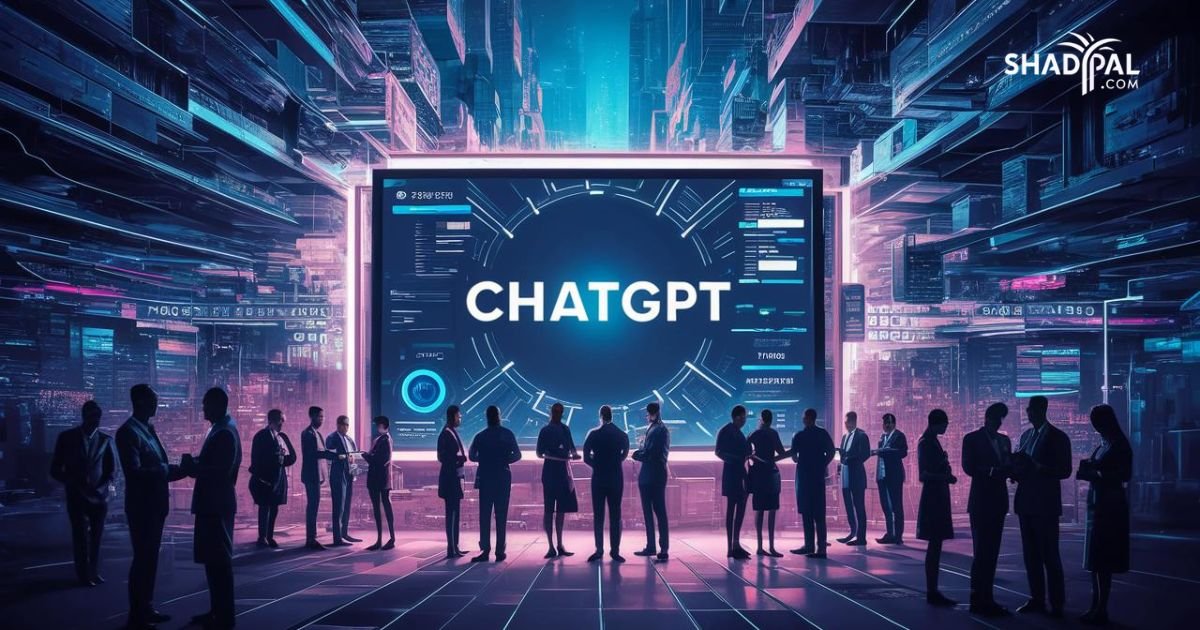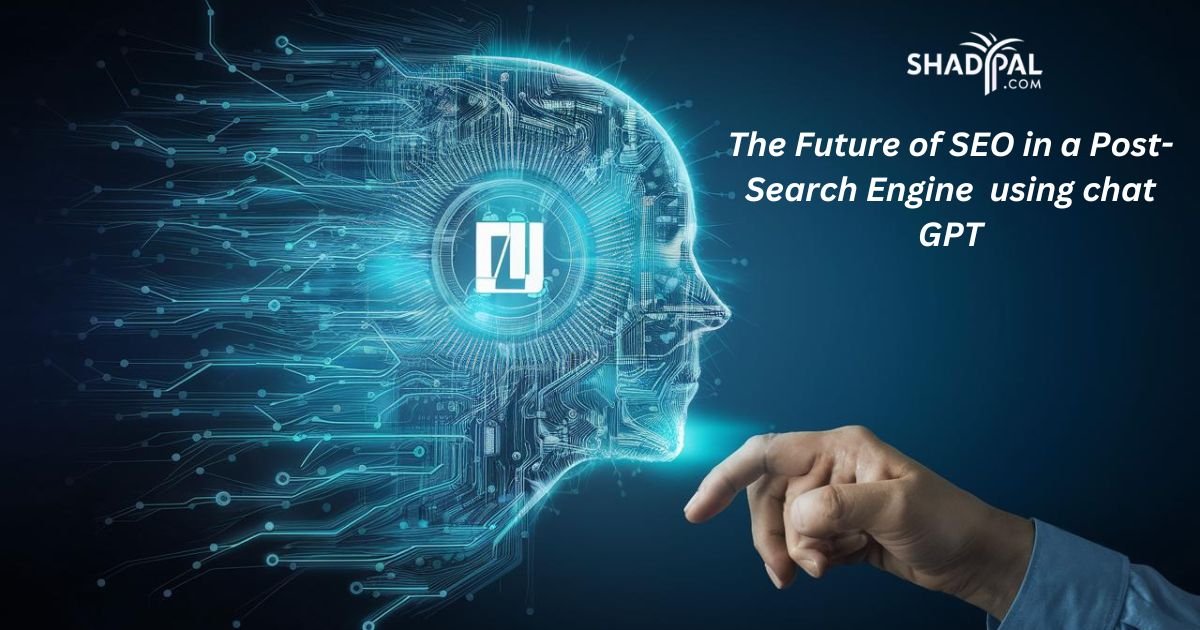Search engine optimization Changing Landscape of SEO
The foundation of digital marketing techniques has always been search engine optimization, or SEO. For decades, businesses, content creators, and marketers have meticulously optimized their websites and content to rank higher on search engine results pages (SERPs), predominantly those of Google. The goal was clear: to attract organic traffic, increase visibility, and ultimately drive conversions. However, the advent of advanced AI models like ChatGPT is disrupting this established paradigm.
What if search engines as we know them become obsolete, replaced by AI-driven conversational agents like ChatGPT? In this hypothetical yet plausible future, the way we approach SEO would need to undergo a radical transformation. This blog will explore the potential future of SEO in a world where traditional search engines are supplanted by AI, offering insights into how businesses and marketers might adapt to maintain their online presence and relevance.
The Decline of Traditional Search Engines and the Rise of ChatGPT
ChatGPT and similar AI models are becoming increasingly sophisticated, offering users instant, conversational responses to queries. Unlike traditional search engines, which provide a list of ranked links for users to explore, In the present & future, ChatGPT Revolution delivers direct answers, often synthesizing information from multiple sources into a cohesive response. This shift in how information is accessed could lead to a significant decline in the use of traditional search engines.
The Current Role of Search Engines
Before delving into the future, it’s essential to understand the current role search engines play in our digital ecosystem. Search engines are gatekeepers of the internet, indexing and ranking billions of web pages based on complex algorithms that consider factors such as relevance, authority, and user experience. SEO has evolved alongside these algorithms, with practitioners continually adapting to updates like Google’s Panda, Penguin, and Hummingbird.
SEO strategies today involve a mix of keyword optimization, backlink building, content creation, and technical improvements. The ultimate goal is to align with the search engine’s ranking factors to appear on the coveted first page of results. However, as AI models like ChatGPT become more integrated into how we search for and consume information, the traditional role of search engines—and, consequently, SEO—could be upended.
The Emergence of AI-Powered Search
ChatGPT represents a new era of information retrieval. Rather than sifting through multiple links, users can ask questions and receive immediate, tailored responses. This conversational approach not only saves time but also enhances user experience by delivering more personalized and relevant content. As AI models continue to improve, they could eventually render traditional search engines redundant, fundamentally altering how we interact with information online.
How SEO Will Evolve in a ChatGPT-Dominated World
If ChatGPT and similar AI models become the primary means of accessing information, the strategies and tactics of SEO will need to evolve. The focus will shift from optimizing content for search engines to optimizing it for AI-driven conversational agents. Below are some potential ways SEO could adapt to this new landscape.
1. Optimizing for AI Understanding
Traditional SEO involves optimizing content to be easily understood by search engine algorithms. In a world dominated by AI like ChatGPT, the focus will shift to ensuring that AI can effectively parse and understand the content. This might involve creating content that is clear, concise, and contextually rich, enabling the AI to extract the most relevant information.
- Natural Language Processing (NLP) Optimization: As AI relies on NLP to understand and generate human-like text, content creators will need to prioritize language that aligns with NLP models. This includes using natural sentence structures, avoiding jargon, and ensuring that the content is easy to digest.
- Structured Data and Metadata: While AI models like ChatGPT Revolutioncan process unstructured text, structured data will still play a crucial role in helping AI understand the context. Incorporating metadata and structured data formats like schema markup could assist AI in accurately interpreting content, enhancing its ability to provide relevant responses.
2. Content Quality and Authority Will Be Paramount
In a post-search engine world, where users rely on AI to filter and present the most relevant information, content quality and authority will become even more critical. AI will likely prioritize content that is well-researched, authoritative, and trustworthy.
- Expertise, Authority, and Trustworthiness (E-A-T): Already a significant factor in Google’s ranking algorithms, E-A-T will become even more critical in an AI-driven environment. Content creators will need to establish their authority within their niche by producing high-quality, well-sourced content that AI can confidently present to users.
- In-Depth Content Creation: With AI capable of synthesizing vast amounts of information, surface-level content will likely be deprioritized. Instead, creating comprehensive, in-depth content that provides real value to users will be essential. Long-form content, case studies, white papers, and detailed guides could become more prevalent as businesses seek to create content that stands out in an AI-driven landscape.
3. The Importance of Conversational Content
As AI models like ChatGPT engage users in natural, human-like conversations, the tone and style of content will need to become more conversational. This shift could lead to changes in how content is written and presented.
- Conversational Tone: Content that mimics the natural flow of conversation will likely perform better in a ChatGPT-dominated world. This means adopting a more informal, engaging tone, using contractions, rhetorical questions, and direct address to the reader.
- Question-and-Answer Formats: Given that users will interact with AI in a Q&A format, content that anticipates and answers common questions will become more valuable. Creating FAQs, How-To guides, and other Q&A-style content will help ensure that AI presents your content as a reliable source of information.
4. The Role of Visual and Multimedia Content
While text-based content will remain important, the role of visual and multimedia content will likely grow in significance. AI models will need to interpret and deliver content in various formats, making it crucial for businesses to diversify their content offerings.
- Video Content Optimization: Video content is already a significant component of digital marketing strategies, and its importance will only increase in a ChatGPT-dominated world. AI models will need to understand and index video content, making video SEO a critical focus. This could involve optimizing video metadata, using transcripts, and ensuring that video content is accessible to AI.
- Interactive Content: As AI becomes more interactive, content that engages users through interactivity—such as quizzes, polls, and calculators—could become more prominent. AI-driven chatbots, for example, might guide users through interactive content, providing a more engaging and personalized experience.
5. The Evolution of Keyword Research
Keyword research has long been a foundational element of SEO. However, in a future dominated by AI, traditional keyword strategies may become obsolete. Instead, the focus will shift to understanding user intent and creating content that aligns with the types of queries users are likely to ask AI models.
- Intent-Based Optimization: Rather than targeting specific keywords, content creators will need to focus on understanding the intent behind users’ queries. This involves creating content that addresses the underlying needs and desires of users rather than simply matching keywords.
- Semantic Search and Contextual Relevance: AI models like ChatGPT rely on semantic search to understand the context and meaning behind user queries. As a result, the content will need to be contextually relevant and semantically rich, using related terms and phrases to provide a more comprehensive answer to users’ questions.
The Impact on Business and Marketing Strategies

The potential rise of ChatGPT as a primary tool for information retrieval will impact not only SEO strategies but also broader business and marketing approaches. Companies will need to rethink how they connect with customers, build brand awareness, and drive conversions in this new landscape.
1. Shifting Marketing Funnels
Traditional marketing funnels are built around attracting users through search engines, guiding them through various stages of the buying process, and converting them into customers. However, if users rely on AI for information, the marketing funnel will need to adapt.
- AI-Driven Customer Journeys: In a world where AI guides users through the customer journey, businesses will need to create content that aligns with each stage of the buying process. This might involve developing content that educates potential customers, answers their questions, and provides solutions in a way that AI can easily understand and present.
- Personalization at Scale: AI’s ability to deliver personalized responses will raise the bar for customer experiences. Businesses will need to invest in personalized marketing strategies, leveraging data to create tailored content that meets the specific needs and preferences of individual users.
2. The Role of Brand Building
In a post-search engine world, where users may not see a list of brand names but instead receive a synthesized answer from an AI, brand building will become even more crucial. Businesses will need to find new ways to ensure their brand is recognized and trusted by AI models.
- Building Trust with AI: Just as businesses work to build trust with search engines through backlinks and authority signals, they will need to build trust with AI models. This could involve ensuring that their content is well-cited, authoritative, and linked to reputable sources, as well as maintaining a consistent online presence across various platforms.
- Brand Recognition in AI Responses: Companies will need to find ways to ensure that their brand is mentioned in AI-generated responses. This might involve creating highly authoritative content that AI recognizes as a primary source or developing partnerships with other trusted brands and institutions to boost credibility.
3. The Future of Paid Advertising
Paid advertising is another area that will likely see significant changes in a ChatGPT-dominated world. Traditional pay-per-click (PPC) models may become less effective if users are no longer clicking on links but instead receiving direct answers from AI.
- AI-Integrated Advertising: Businesses may need to explore new advertising models that integrate with AI. This could involve sponsored content that is seamlessly incorporated into AI responses or developing new formats for AI-driven ads that provide value without disrupting the user experience.
- Content Sponsorship and Native Advertising: As users rely more on AI for information, native advertising, and content sponsorship could become more important. Brands might sponsor content or partner with AI platforms to ensure that their products and services are recommended in relevant contexts.
Challenges and Ethical Considerations
The shift towards AI-driven information retrieval presents several challenges and ethical considerations that businesses and marketers will need to navigate.
1. Data Privacy and Security
As AI models like ChatGPT rely on vast amounts of data to provide accurate responses, concerns about data privacy and security will become more prominent. Businesses will need to ensure that they are collecting and using data responsibly, complying with regulations such as the General Data Protection Regulation (GDPR) and the California Consumer Privacy Act (CCPA).
- Transparency and Consent: Companies will need to be transparent about how they collect and use data, ensuring that users are fully informed and have given their consent. This could involve developing clear privacy policies and providing users with greater control over their data.
- Data Security: As AI models become more integrated into business operations, securing data against breaches and cyberattacks will be critical. Businesses will need to invest in robust cybersecurity measures to protect sensitive information.
2. The Risk of Misinformation
AI models like ChatGPT can inadvertently spread misinformation if they rely on inaccurate or biased sources. This presents a significant challenge for businesses, particularly those in industries where accuracy and reliability are paramount.
- Ensuring Content Accuracy: Businesses will need to ensure that their content is accurate, up-to-date, and based on reliable sources. This might involve implementing stricter editorial standards, fact-checking processes, and collaborating with subject matter experts.
- Combating Bias: AI models can also perpetuate biases present in the data on which they are trained. Businesses will need to be aware of potential biases in their content and take steps to address them, ensuring that their content is fair, inclusive, and representative of diverse perspectives.
Conclusion about Embracing the Future of SEO in an AI-Driven World

The potential shift from traditional search engines to AI-driven models like ChatGPT represents a seismic change in how information is accessed and consumed online. While this shift presents significant challenges for businesses and marketers, it also offers new opportunities to innovate and adapt.
In the future, the role of SEO will evolve from optimizing content for search engine algorithms to creating content that resonates with AI models and provides real value to users. By focusing on content quality, authority, and user intent, businesses can position themselves to succeed in a world where AI guides the user experience.
As with any significant technological shift, the key to success will be adaptability. Businesses that embrace the potential of AI, invest in high-quality content, and prioritize user experience will be well-positioned to thrive in a post-search engine world. The future of SEO may be uncertain, but one thing is clear: those who are prepared to evolve will lead the way in the new digital landscape.
Final Thoughts..
The future of SEO, in a world where AI like ChatGPT replaces traditional search engines, is both exciting and daunting. As we look ahead, businesses need to start thinking about how they can adapt their strategies to remain competitive in this new environment. By focusing on content quality, authority, and a deep understanding of user intent, businesses can not only survive but thrive in the AI-driven future of SEO.
